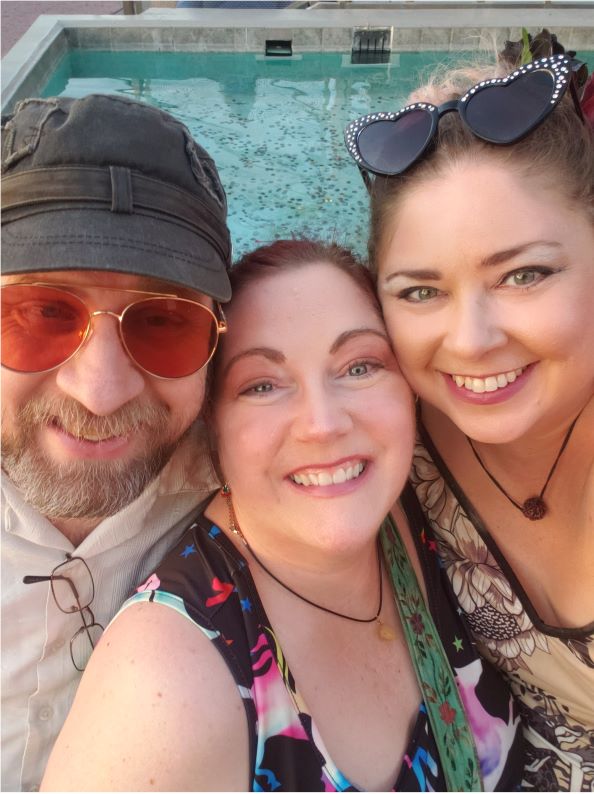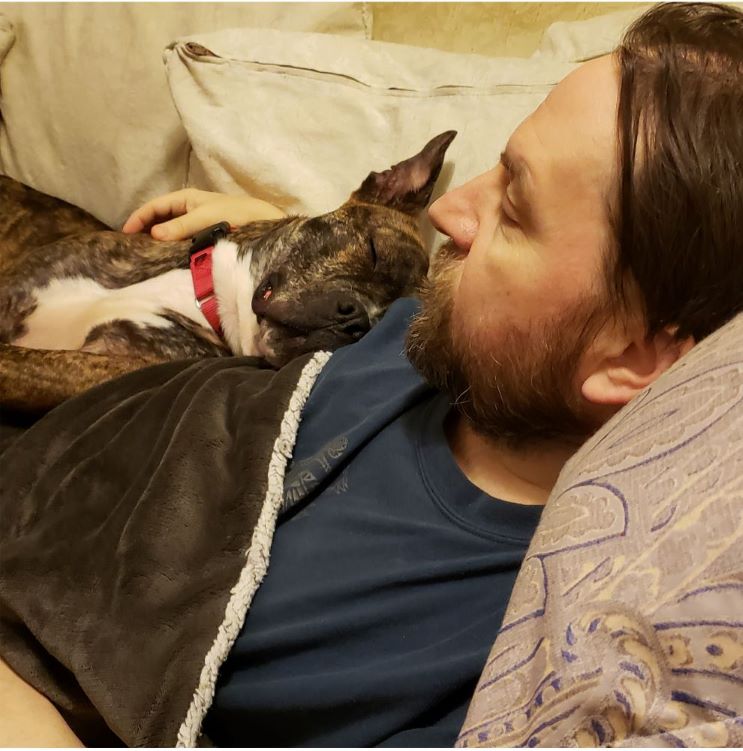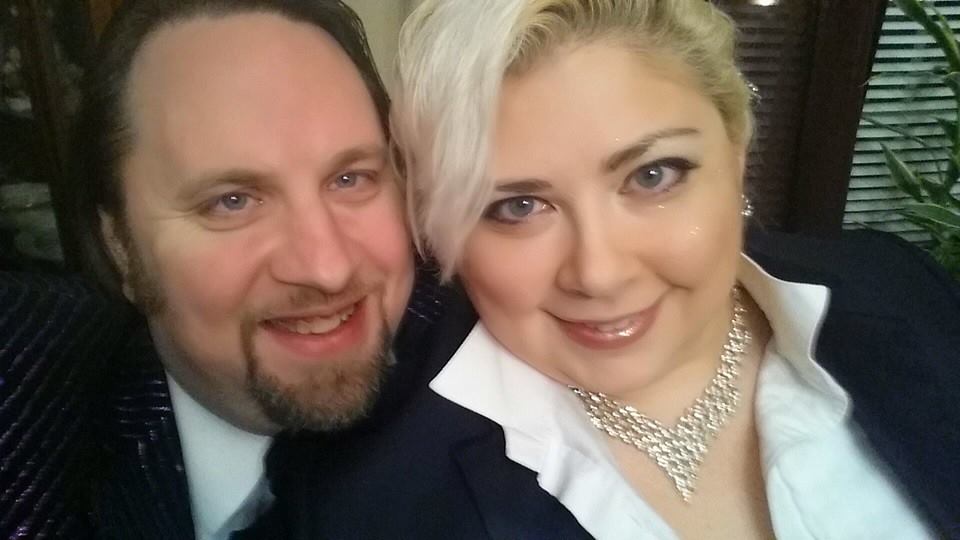Over the course of their relationship, Rebecca Rose Vassy supported her long-term partner Sean in managing multiple chronic health conditions. Then a cascade of medical complications caused Sean's health to decline rapidly, and Rebecca's role shifted dramatically. She became a full-time caregiver, providing 24/7 support at home and later at the hospital, until Sean’s passing in July 2023.
Caring for Sean brought with it sleepless nights, physical demands, the overwhelming task of coordinating Sean’s care, and the emotional toll of witnessing his pain as his health declined. But through it all, Rebecca found strength in the love she shared with Sean and the support of an extended network of friends, chosen family, and partners, as well as Sean’s dedicated clinical team.
By sharing her story, Rebecca hopes to bring awareness to the challenges of caregiving, help others navigate caring for a loved one in a health crisis, and inspire greater understanding and support for those in caregiving roles.
Tell us about your caregiving journey and how you became a caregiver for your partner.
Sean and I lived together for 29 years. He had some health issues, like hypertension and diabetes, but everything was fairly well managed for a long time.
Then, two weeks into the pandemic, Sean got pneumonia, and we took him to the hospital. While there, doctors noticed his kidney function was declining. By August of 2020, he was experiencing severe edema (swelling caused by fluid in the body’s tissues), tiredness, pain, and difficultly getting around. His doctor sent him to the ER, where they put him on dialysis. He eventually transitioned to peritoneal dialysis, which was much easier and more comfortable for him. We were even navigating the process of getting him a kidney transplant.
Things took a turn for the worse in March 2023. Sean’s doctors put him on steroids because they thought he might have giant cell arteritis (inflammation of the arteries), but we needed a biopsy to confirm the diagnosis. But due to a breakdown in communication between his medical teams, he was on unnecessary steroids for about a month, which led to him developing a series of serious bacterial infections. From that point, it was just one thing after another, and his body couldn’t keep up.
Before this decline, Sean was on disability and sometimes needed a little more support with daily things, but it was very light caretaking. In March 2023, he became essentially bedridden, and I took care of him 24/7. He was hospitalized again in early May and was there until he died on July 11, 2023.
How did you stay informed about Sean’s health condition and treatment options?
Before Sean started dialysis, I often went with him to medical appointments. Sean and I were each other’s life partners in our polyamorous relationship. His other partner, Christine, was also very involved in his care. Christine is a pharmacist, so she could understand his medical chart, ask questions I wouldn’t have known to ask, and explain things to me that would otherwise have been overwhelming. That was unique to our situation and incredibly valuable. I tell people that’s what polyamory is really about: all these things we've supported each other through.
Once he began treatment, either Christine or I attended every appointment. Sean had a fear of needles, so sometimes we’d just sit there and hold his hand. It also meant there was always someone there to ask questions and keep track of information.
We had an amazing clinic staff. When Sean was on peritoneal dialysis, he had to go in frequently for appointments. I would call it the “clinic party” because we’d see everyone there. Nurses, nutritionists, social workers would all come in and discuss all aspects of Sean’s life, ask about his mental health, and give their recommendations.
Sean and I also did our own research. He was a curious guy and liked to dig into the medical information himself.

Sean (left), Christine (center), and Rebecca (right).
Can you describe what a typical day or week looked like for you as a caregiver?
It was easier before Sean’s kidney disease. Once he went on dialysis, he wasn’t allowed to lift more than 25 pounds, and he would get tired easily. There was a lot less he could do day-to-day. He loved to cook, though, and sometimes the one thing he could do that day was make me dinner. I know he wanted to do more, but we had to manage his energy carefully.
Sean couldn’t work, so I worked at least full-time, often doing side hustles to make sure we were supported financially. Things had to get done, so I did them, but there was always so much to do. Many of my days were nonstop from when I got up until I went to bed after midnight.
“I have never been so exhausted…Even though I had all these people around, I also felt very isolated, like I was the only one really on deck for that level of care.”
How did your role change over time?
After he started to get really sick, he could barely walk and couldn’t get upstairs to our bedroom. He lived on our living room couch, and I slept on the other couch because he needed someone to help him to the bathroom, soothe him when he was in pain, and be available for anything that came up. He only ate if I stayed on top of him to do so. My entire existence was devoted to him, often at the expense of work, social life, everything else. For several weeks we had a home health care aid for a few hours a day. She mostly helped fetch him things, pushed him in his wheelchair, and came to medical appointments. But I still had to be on call because there were things she couldn’t do, like lift him to his feet.
Once he went into the hospital, Christine and I would alternate visiting him and resting ourselves. Most days I’d get up, go to the hospital, and spend as much time there as I could. As his condition worsened and he was in more pain, we were often moving nonstop. It was so hard to make him comfortable or to get him to eat, drink, and take his meds.
As his cognition started declining, it became harder to just communicate with him. A lot of that time he felt frustrated and guilty. He had trouble expressing himself—sometimes hallucinating, saying weird things, losing words or using the wrong ones—and I was trying to interpret what he needed.
What resources or support systems did you find most helpful in your caregiving journey?
I had some help. My housemate stepped in and took over the household chores. My other partner Ben (not his real name) stayed with us until after Sean died and provided additional household support. Christine and Ben also managed Sean’s visitation schedule. There was a group chat to coordinate that, so I didn’t need to think about it.
I shared a lot about what was going on with my personal network on social media. I always made it clear I wasn’t looking for advice, but it created opportunities for people with similar experiences or conditions to be like, “Hey, do you mind if I tell you something that was really helpful for me?”
How did you take care of your own health and well-being during that time?
In a lot of ways, I didn’t. I put off my own medical appointments. Sometimes eating was just grabbing a hot dog or whatever. There were days I didn’t eat anything until late in the evening.
Therapy was very helpful, as was having friends who had lived through similar types of intense experiences. I could post things like, “I managed to get away for half an hour to scream and cry in the shower.” People would tell me, “You need to take more time off. You need to let other people shoulder things.” Even my therapist told me Sean didn’t need me at the hospital all the time. Looking back now, though, I don’t regret a single minute I spent there.

Sean with their foster dog, Chance.
What were the most difficult or challenging experiences you faced as a caregiver?
The absolute hardest time was when I was caring for him at home. I have never been so exhausted. He was asking for things constantly, waking me up multiple times in the middle of the night when I was only getting a few hours of sleep to begin with. I couldn't even think straight. I just had no emotional resources left. Sometimes I would be upset with myself for getting impatient or frustrated with him because he was suffering so much and doing his best, and he felt so guilty about needing so much from me. Even though I had all these people around, I also felt very isolated, like I was the only one really on deck for that level of care.
The most difficult thing was seeing Sean in so much pain. He was on various opiates, but the pain management was not consistent. There were times he'd be screaming in pain for hours, and there was nothing I could do. It’s horrifying, hearing the person you’ve loved for so many years constantly in agony.
“Just letting someone know you’re here and you’re thinking about them can help so much with the isolation. Drop them a message saying, ‘You don’t have to respond, but I love you and I’m thinking about you today.’”
Can you share any moments of joy or fulfillment caregiving brought into your life?
We had what we didn't know would be our last date in April 2023. Sean needed a wheelchair to leave the house, which he only did for medical reasons. But he really, really wanted to go see this one movie. So I took him out in the wheelchair; we saw the movie and had dinner. It was the most normal time we had during that period. He was exhausted the next day, but it was totally worth it. He was so happy to get out of the house and do something fun.
As his cognition declined, he became more and more childlike. He always wanted me there. When his mind was clearer, he understood that wasn’t always possible, and he would encourage me to take breaks. Other times he just wanted me there because I was a comfort to him. But he never lost so much cognition that he couldn't tell me he loved me. I would be getting ready to leave, and he'd be straining up in bed as if he had to express it with his whole body: “I love you so much. I love you with my whole heart.” It was hard to see him in this childlike state, but there was also a beauty and a purity to it. The last coherent thing he ever said to me was, “I love you, too.”
What advice would you give to someone who is new to caregiving or who may be considering it soon?
Rally any kind of support you can and be very specific about what you need. So many people wanted to help, or give me advice, or tell me their horror stories. It was overwhelming. I put Ben in charge of filtering everything and directed it all to him. That structure prevented me from drowning in information, and it meant I knew who I could fall back on.
Most importantly, let them know exactly what you need from them at any given moment. It might feel impersonal, but a lot of the time it’s going to be cash.
How can friends, family, and communities better support caregivers?
Honestly, just letting someone know you’re here and you’re thinking about them can help so much with the isolation. Drop them a message saying, “You don’t have to respond, but I love you and I’m thinking about you today.”
Make your help available without pushing it on them. If you’re able, take on a liaison role to manage tasks for them.
And don’t apologize for not doing more. That puts the burden on the caregiver to do the emotional labor of making you feel better. Focus on helping them, not making yourself feel good. You might want to cook your favorite dish to share, but it’s not actually helpful if somebody in the house can’t eat it.
What do you wish more people understood about the experience of being a caregiver?
This experience really showed me how desperately we need to rethink how our society functions, especially around caregiving and disability. In Sean’s last five months, the only reason I kept my job was because my boss was kind enough to keep paying me even though I was limited with how much I was able to work. But I couldn’t do my side work in coaching and education. There's no reason I should need to worry about deciding between paying rent or caring for a partner during a health crisis.
Whatever the solution is, it shouldn’t rely on an individual person having this incredibly sophisticated, well-resourced network of their own because that's not something everybody has access to. We need a lot more social safety nets than we have.
Is there anything else you want to share about your experience as a caregiver?
It was wonderful to interact with the nurses, doctors, and all the staff. Having people I could trust with his care, who knew him by name and were kind to him, made such an incredible difference. I would sometimes just sit there, amazed, when I thought about the sheer immensity of training, staff, expertise, resources, medicine, and developments—this vast network of people and things keeping one person alive. It's mind-boggling. And when you multiply that by the number of critical care patients in this country, it’s even more mind-blowing.
And never stop telling people you love them. One of the most comforting things I have now is that nothing important went unsaid.







